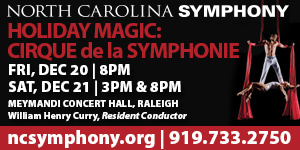In this time when we seem engulfed in negativity (mostly relating to politics), it was more than refreshing to hear the Bösendorfer Trio (David Sariti, violinist, Brent Wissick, ‘cellist, and Andrew Willis, fortepianist) in a beautifully-played program of chamber works by Felix Mendelssohn: the Sonata in F for Violin and Piano (1820/1839, unpublished until 1953); the Sonata in D for Violoncello and Piano, Op. 58 (1843); and the C minor Trio for Violin, ‘Cello, and Piano, Op. 66 (1846).
Playing in the intimate space of Person Hall on the UNC campus, the three artists let us hear this music much as Mendelssohn himself would have heard it, with a fortepiano instead of a modern concert grand and gut strings on violin and ‘cello. As the excellent program notes pointed out, “The violinist and cellist, no longer in an existential struggle for audibility, are able to pursue greater freedom in articulation and tone color. The pianist, unafraid of burying his colleagues alive, can do likewise.”
The musicians are faculty members at UNC-Greensboro (Willis), UNC-Chapel Hill (Wissick), and the University of Virginia (Sariti); these were, however, not ‘academic’ performances. Each member of the Trio, despite the demands on his time from teaching and related university activities, is a virtuoso performer. This was chamber music at a high professional level, reflecting credit on the schools that choose to have their students taught by musicians who not only have academic credentials but are also first-class performing artists. This Mendelssohn program was the second of three, as the Trio is performing it at each member’s university. The last of the three concerts is set for Sunday, October 20, at 3:30 pm, at UVA in Charlottesville.
Mendelssohn’s melodic genius was apparent throughout the three works, whether in one instrument only, in the composer’s “song without words” style, or tossed back and forth between two or three instruments in imitation. Colors abounded: Willis’ brilliantly-tossed-off piano figurations, sometimes at eight notes per second (and that’s only in one hand!); Sariti’s warm, singing treble register on his modern copy of Guarneri’s 1735 “Plowden” violin; Wissick’s ringing pizzicati and rich lower registers.
In short, magisterial performances of three works by one of Western civilization’s most brilliant composers brought felicity, grace, power, and beauty into our lives.
The Newman series at UNC continues on October 27; for details, click here.











